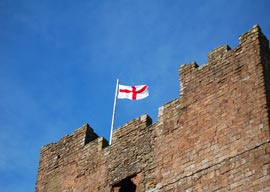
April 30, 2015

Source: Shutterstock
Even so, Englishness has experienced a recent revival – partly because football has become middle-class, partly as reaction against Celtic nationalism, and partly because of a growing realization that England is in existential danger. Politicians are tardily noticing the injustice of granting political privileges and economic benefits to the Celtic fringe while denying them to 84% of the UK’s population. Both the Conservatives and UKIP, although unionist, are de facto English parties, drawing virtually all of their support from south of Hadrian’s Wall and east of Offa’s Dyke. Mostly as a means of undercutting UKIP, the Conservatives have launched their first English manifesto, offering lower tax, more houses and jobs for the English regions.
Perhaps more lastingly, there are sympathetic new examinations of English identity, and a very successful English Music Festival. Now the evocative emblem can even be seen on churches, like the one that towered above the Stamford dancers – which would have pleased Rev. J. Ingram, who in 1823 enthused that after the Old Testament, The Anglo-Saxon Chronicle (which he had translated) was “the second great phenomenon in the history of mankind”. For him and many others, God was indubitably an Englishman, and of one of the more respectable classes.
Back in Stamford, and the dragon-slayer’s device was still flying in the sun, but down below the dance was done. The less respectable English were going home, their measures trod, their duty done, their old, embarrassed country injected with their energy. Green-and-yellow bedizened stragglers strolled back towards cars and normality, carrying drums and calling to each other as the street went quiet and the pubs came alive. We smiled at each other, and shook awake, and followed their example.